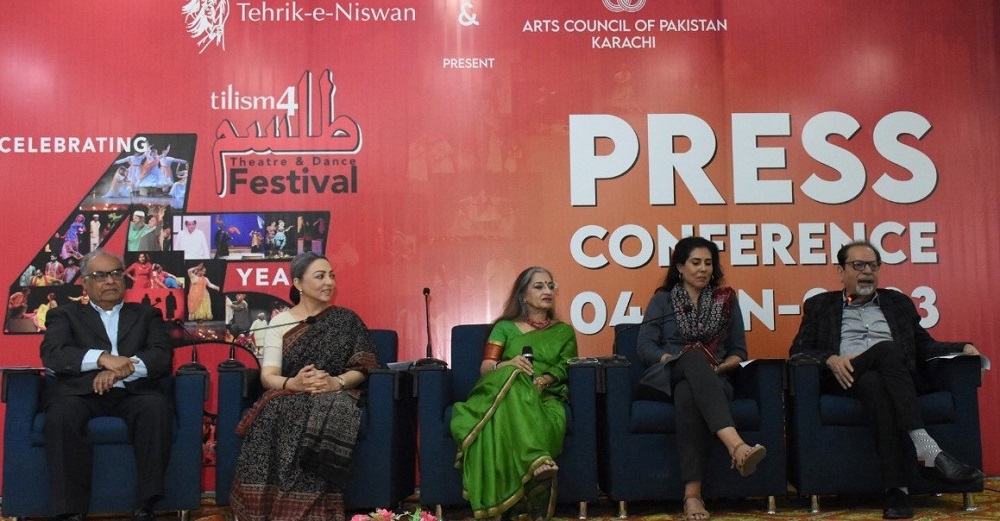Written by: Hurmat Majid
Posted on: January 18, 2023 |  | 中文
| 中文
A snap from Gaon Mei Roshni
The 4th Tilism Theater and Dance Festival has been on at the Arts Council of Pakistan (ACP), Karachi since January 6. The 17-day festival marks the completion of 45 years of Tehrik-e-Niswan. Tehrik-e-Niswan is a women's movement active in the areas of domestic violence and peacebuilding. They organize dance festivals for peace and disarmament.
At the opening of the Festival, the founder of Tehrik-e-Niswan, Sheema Kermani, said that the journey of the organization has been difficult, “more so because women had a hard time recognizing themselves before seeking recognition in the world, for all of the wonderful things that they do.” She said that 45 years down the road, we are now celebrating the existence of women in its truest form. President of the Arts Council, Mohammad Ahmad Shah, said that Arts Council welcomes the Tehreek-i-Niswan’s initiative to hold a festival celebrating women, but also cultural diversity and giving everyone a voice. “We have made a conscious effort to ensure that the ACP remains a neutral space where everyone can express their artistic and cultural ideas freely, and people have equal rights, irrespective of their gender.”

A picture of the pre-opening press conference. (L to R) Ahmed Shah, Laila Jameel, Sheema Kermani, Azra Mohuddin and Kaleem Durrani
The opening performances at the festival included a classical dance performance by Sohai Ali Abro, a performance of the Tehreek-i-Niswan’s anthem and talks on the need for cultural inclusivity in Pakistan. Over the weekend, a group of theatre performers from Tehreek-i-Niswan created magic on stage by presenting an Urdu rendition of 1001 Nights. The play took on an adventure into time and space, while asking open-ended questions about acceptance and diversity that were left for the audience to ponder over.
Gaaon Mei Roshni is the Urdu adaptation of Jo Clifford’s ‘Light in the Village’. The play highlighted the plight of women who live in rural areas with inadequate resources, which results in their poor quality of life and the question is posed whether this would ever change. Clifford, who was present for the festival, gave a talk titled ‘Building a Theatre of Love’, which was about cultural representation and diversity on stage.
The festival also premiered the romantic play Indar Sabha, which had a fantastical quality to it. This play was a romantic dance and music extravaganza with exquisite costumes, sets and lights. It is expected that the Tehrek-i-Niswan theatre team will put up more performances of this show around the country, later in the year.
The play Jinnay Lohor Ni Vekhya celebrated the historical significance of the most culturally diverse city of Punjab. Kirchi Kirchi Karachi took audiences through the struggles that the people of Karachi face because of cultural and racial discrimination.
The performances that have been put up until now have successfully delivered messages of cultural harmony and acceptance. While the common perception of the Tehreek-i-Niswan is of a women-centric organization, the activities that they have put up in this year’s Tilism festival show that they believe in much more than just providing women with a platform to make their grievances public. Their main focus in the past few years has been to provide an adequate voice to those who have been culturally and racially marginalized in the country.
Upcoming performances in the festival include Mohenjo-daro, a puppetry play about the magical land of Sindh and its diverse culture. The play was presented to mark the 100 years of the discovery of Mohenjo-daro. Here we are expected to see a giant puppet rendition of the Dancing Girl of Mohejo-daro stay in sync with the likes of Sheema Kirmani as they dance together. One of the shows expected to be most popular on stage is a comedy play called Behrupiya. Other than that, Mujh Mei Tu Moujood would take the audience through the journey of a female mystic.
The festival will continue till January 22, with a female-only mushaira and a couple of plays left to be performed. The shows begin daily at 7:30 pm. The festival is a cost-free event, however, children under the age of twelve are not allowed to attend.
You may also like: